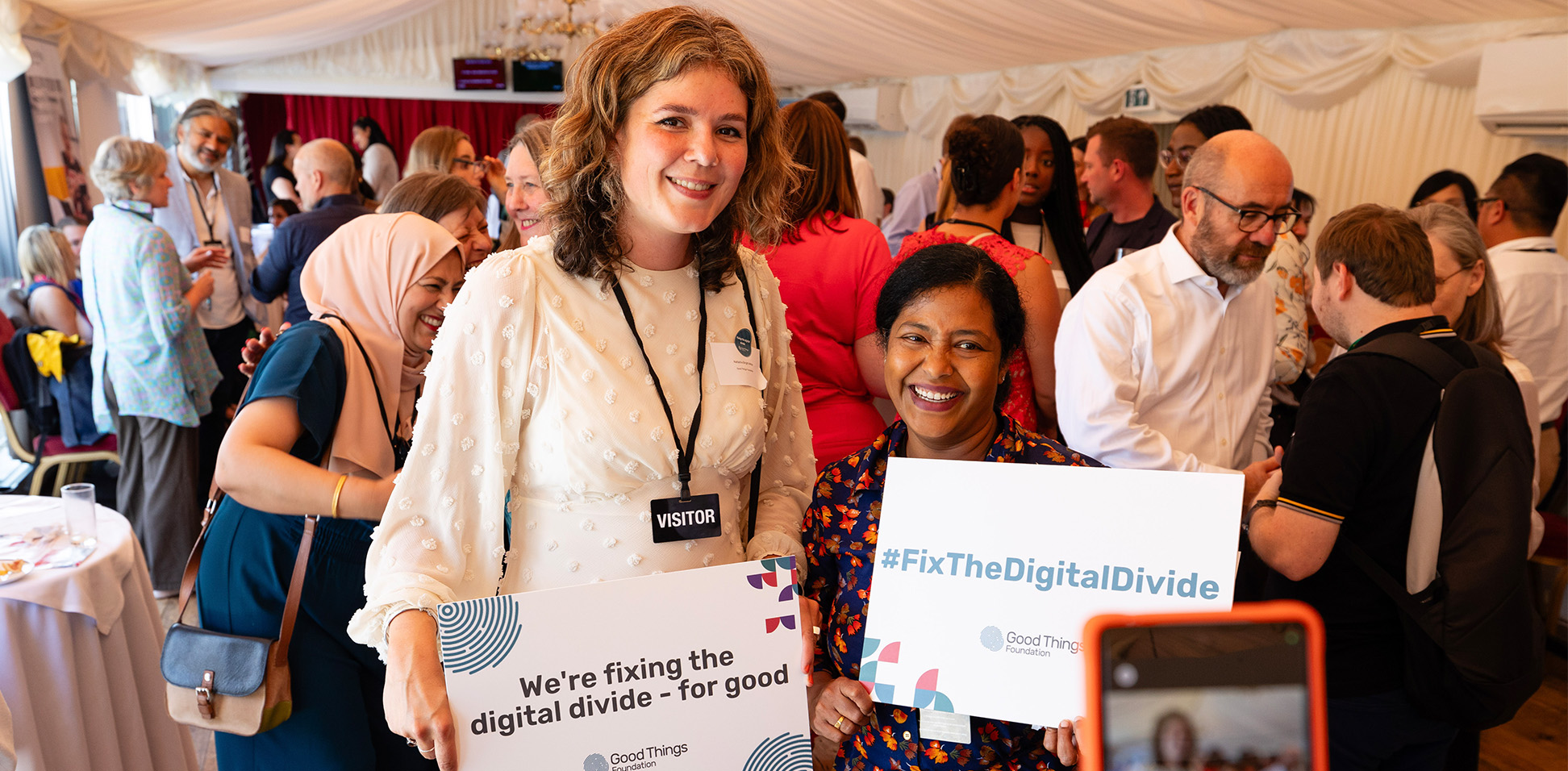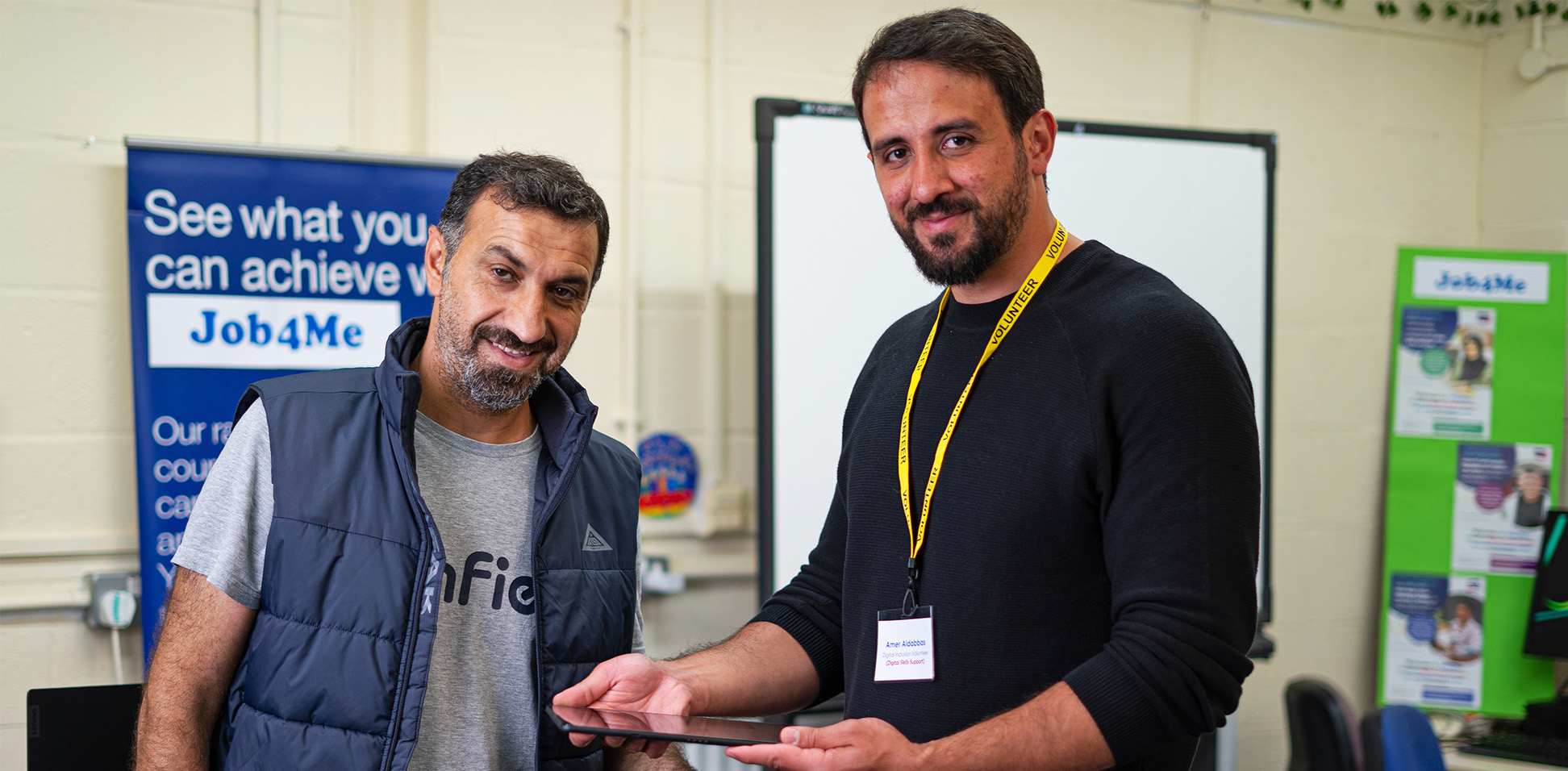PressPlay: What libraries are telling us about digital inclusion
Community Engagement Manager, Louise Branch, provides her insights on the Library On Press Play event she attended in March.
On 1st March, I was lucky enough to attend the Library On Press Play event, an annual celebration of all things digital in libraries powered by the British Library. Not only did I get to visit the beautiful Knowledge Centre, but I also got to meet lots of libraries colleagues in person for the first time!
Despite the depressing headlines of late, the space was buzzing with energy, ideas and sheer dedication to make sure everyone can access information of all forms. Digital inclusion was a key theme, with digital accessibility, media literacy and access to increasingly online public services coming up as recurring points throughout the day.
Along with the super team from Cambridgeshire Libraries, other than Rosie who was held back by train strikes, we ran a Libraries Digital Inclusion Meet-up live, in person, for the first time ever. It was incredible the impact of being in the same physical space and how much we were able to cover in a short 45 minute session without the technicalities and awkwardness of Zoom to contend with.
We went back to basics for this meet-up to discuss: What digital support do people in your community need, and what do you / can you do about it?
Here are some highlights:

People still need support with basic digital skills
One attendee said that “things haven’t changed since 2007” and technology is moving faster than ever leaving more and more people behind. Lots of attendees were using Learn My Way
Coping with a “digital first” policy
Council services are pushing people online, but there often isn’t a strategy to support people who are digitally excluded.
Urgent digital needs and troubleshooting
Many library visitors come in needing help with an urgent issue, like help with a specific thing on their device or increasingly help with willing in forms: housing, banking, DVLA, doctors. There were also several mentions of navigating online travel platforms. An interesting challenge that came up was encouraging people to move from “help with an urgent issue” to accessing digital skills training on offer at libraries.
Awareness of benefits available
This theme came up in different forms, from a lack of understanding of what digital can do for them to a need to raise awareness of the digital support services available at libraries (and other benefits beyond books!). Attendees also spoke of their important role in signposting people who visit libraries to other organisations and opportunities in the community.
Young people and job readiness
Several people wanted to highlight the fact that they were seeing increasing numbers of young people who had never used a laptop / desktop before. They might be proficient in navigating their smartphone, but needed help learning how to use other devices and get ready for the world of work.
Mobile Data
A good proportion of attendees were already delivering the National Databank, and had seen the demand for data grow, surpassing expectations in some cases! Neil from Barnet Libraries said they had a huge number of requests for data as word spread to a local hostel housing new arrivals to the UK.
Devices
We heard from libraries doing loan schemes and using hublets to provide access to the internet at their branches. And some attendees said there was a growing number of people that come in to use study zones in libraries with their own devices, making use of library wifi and quiet spaces.
AI and media / digital literacy
Jamie Rowe from Hertfordshire Libraries raised the question of AI, and how we can support people who may not be aware of how AI is used to generate content, and how it might be used to spread misinformation or generate scams. Both during the discussion and beyond, attendees championed libraries' role in helping people to navigate AI-generated content, building on the public’s perception of librarians as “the most trusted profession” and source of reliable information. British Library CEO Roly Keating and Tony Ageh of New York Public Libraries spoke of this, and libraries as a source of truth, in their brilliant discussion.
Accessibility
Outside of our session, we heard about some excellent practice and common challenges in terms of digital accessibility.
The fabulous “digital inclusion activist” team at Barking and Dagenham Libraries told us how they had used a Digital Inclusion Capability Grant from Good Things Foundation to buy accessibility hardware for their inclusive digital zone. Along with digital champions specialising in accessibility, and expert support from RNIB, they are making sure digital is accessible to all.
Dr. Amy Kavanagh led another session on accessibility covering a range of ways libraries can make information accessible, showing how a blind person might use a screen reader, and what that means for the information that libraries put out on their website and social media accounts, what makes a great image description and what to avoid when creating video content.
What’s next?
Along with partners at libraries, we’ll be thinking about how Good Things can best support libraries in the National Digital Inclusion Network to support their communities.
Our next online Libraries Digital Inclusion Meet-up is on 25th April 2024, from 2-3pm. We hope you can join us!


